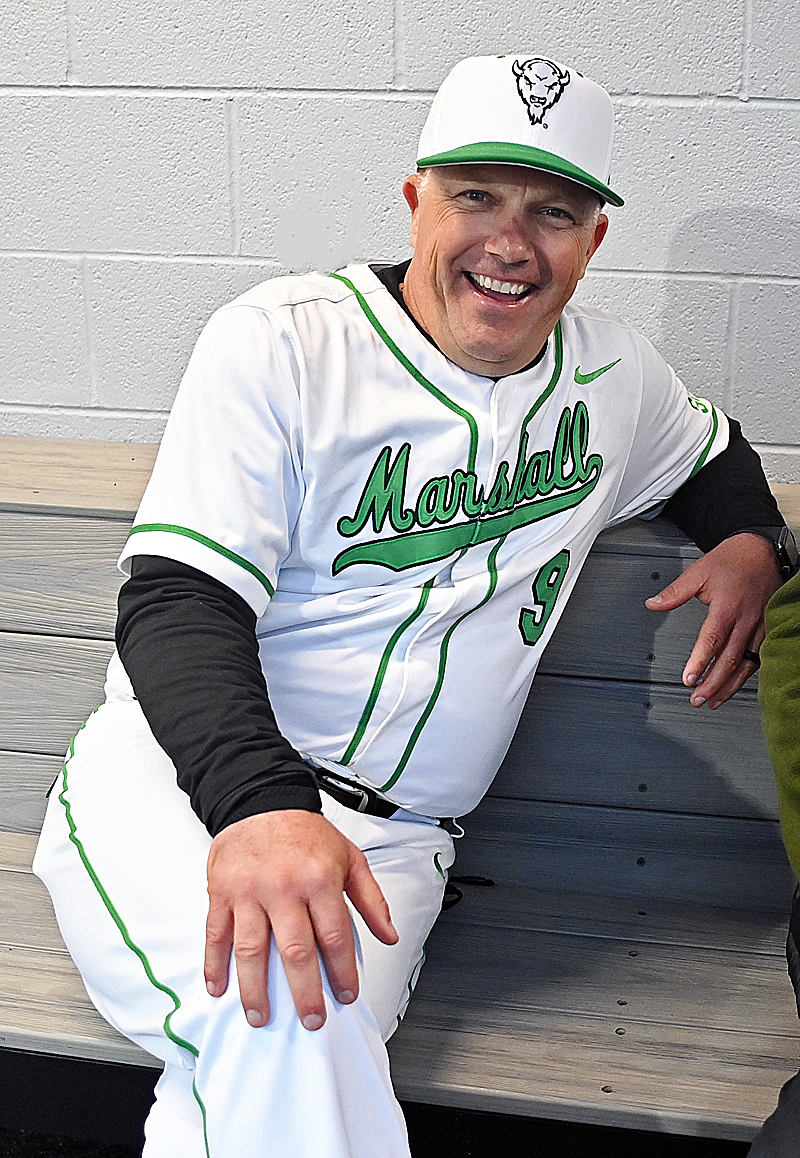New opportunity…new ‘digs’…and a new baseball life in Huntington, West Virginia. It’s easy to say that Springfield’s Greg Beals loves baseball. (Press Pros Feature Photos By Julie McMaken Wright)
The former Ohio State coach lands in a high-level conference, has new high-level facilities and plans to create a high levels of expectations for the Thundering Herd. Jeff Gilbert shares a moving story of baseball redemption in today’s Press Pros.
 Huntington, WV – Greg Beals loves baseball. And the sport of his youth, the sport that gave him a career, is loving him back, again.
Huntington, WV – Greg Beals loves baseball. And the sport of his youth, the sport that gave him a career, is loving him back, again.
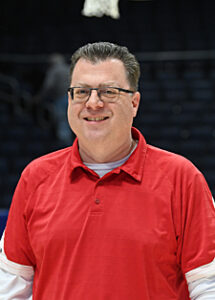
Veteran columnist Jeff Gilbert writes Ohio State basketball and OHSAA sports for Press Pros Magazine.com.
For a brief time in the span of his 54 years, baseball didn’t show Beals the love he was accustomed to when he lost the dream job at Ohio State two years ago. But he found baseball love again in a bend of the Ohio River.
 Because sometimes it finds people in the most unusual ways, and out-of-the way places.
Because sometimes it finds people in the most unusual ways, and out-of-the way places.
Beals is early in his second season as the head baseball coach at Marshall University in Huntington, West Virginia.
And he’s loving it.
“God’s given me a heck of an opportunity to make an impact on young men, and I love this game,” he said sitting in his brand-new dugout last Friday evening. “I have an absolute fundamental belief in education. I get to take those two things with 40 young men every year and help build them up.”
But Beals had to be torn down before Marshall gave him an opportunity greater than the casual observer could imagine. After 12 seasons as the head coach at Ohio State, three NCAA appearances, two Big Ten tournament championships and 366 victories, Beals was let go.
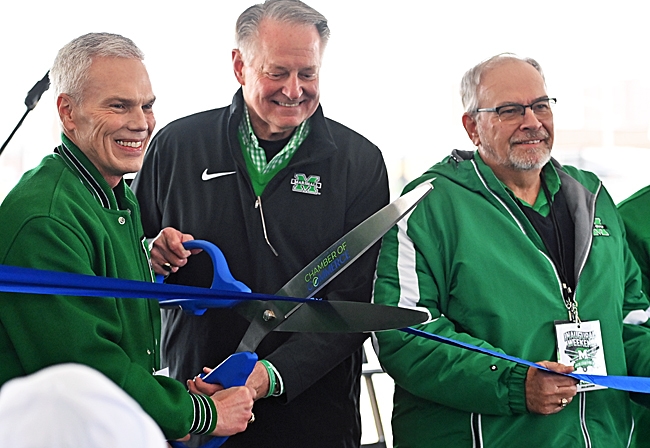
The Ribbon Cutting last Friday at Marshall’s gleaming new stadium on the riverfront in Huntington…Jack Cook Field.
He didn’t know where he would land, but he knew what his next job would be.
“I was going to coach baseball,” he said. “I knew that all along.”
The first opportunity came quickly in July of 2022 when he was hired as head coach at Akron, back in the Mid-American Conference where he got his head coaching start at Ball State. But in early January of 2023, about six weeks before the season opener, Beals was offered the job at Marshall.
Marshall used to play in the MAC. But now, after a run in Conference USA, the Thundering Herd is playing its second season in the Sun Belt Conference. That’s a far bigger deal than it sounds like.
The Sun Belt is recognized as a “power conference” behind only the ACC, SEC and Pac-12, which is in the final year of its historic existence, and maybe the Big 12. In all but six seasons since 1989, the Sun Belt has sent multiple teams to the NCAA regionals, including four bids the past two seasons. Coastal Carolina won the College World Series in 2016.
Beals’ mission: for Marshall University to be one of those four teams every year being invited to play in the national tournament.
“When this job opened up, and I got offered the job and accepted the job,” Beals said, “I literally took a deep breath and said, ‘All right, you’re back. You’re back competing at the highest level.’”
The lure of Marshall
The opportunity to compete in the Sun Belt made sense. But more than conference affiliation attracted Beals. He saw the university’s commitment to give the program a chance to be a factor in the Sun Belt. Plans costing $30 million in new facilities were in process. The next coach would have the tools to make Marshall an NCAA tournament regular.
The upgrade plan was surely needed based on the program’s recent history and lack of facilities.
The Herd’s only NCAA appearances came in 1973 and 1978 as a member of the Southern Conference. The last winning season was 2016. Beals replaced Jeff Waggoner who had a .413 winning percentage in 16 seasons.
Worst of all, the Herd played at a city park, more of a Wandering Herd than a Thundering Herd. Beals’ first season was played at the park, but last Friday he coached Marshall’s first on-campus game in the debut of Jack Cook Field, named in honor of the school’s late baseball coach.
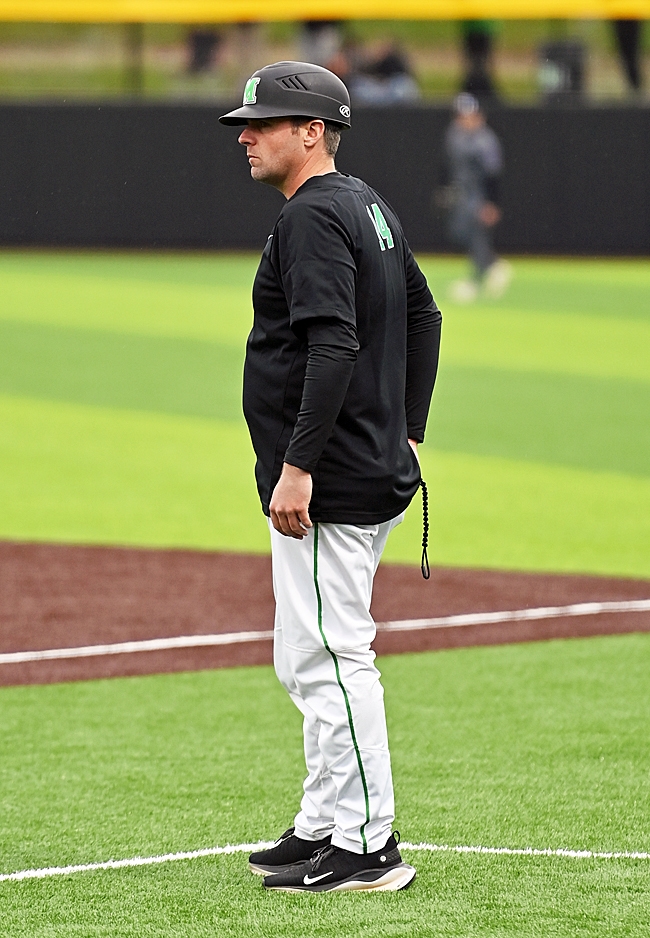
Assistant coach Blair Everhart followed Beals from Ohio State to his own new opportunity in Huntington.
The timing of Beals’ hiring allowed him to be part of the design discussions. He left the seating and suite areas of the stadium to others. But he wanted an artificial playing surface and a padded outfield wall.
The result is a place where little boys can come, watch their heroes, and fall in love with baseball. Jack Cook Field, with its green and black seats, accessible concession stands and suites, is the jewel of the Jewel City.
But there’s more. If the players think of the field as home, they will think of the Alex Lawrence Clubhouse, a large indoor facility beyond the left-field fence, as their multi-purpose man cave. The size of the building was determined when Beals was hired, but he got to design the inside.
Just inside the front, double-glass doors there’s a postgame buffet of barbecue and slaw. To the left, you see into the major-league sized clubhouse with a high ceiling and bright lights. Green carpet and Marshall logos revel in whose home this is. Above each locker stall hangs a sign with the player’s name and photo.

The Dave Arbogast family of dealerships proudly sponsors the best sports features on Press Pros Magazine.
On the other side of the clubhouse is an indoor hitting facility with three cages. Down another hallway is a plush team meeting room with theater-style seating. Next to that are the coaches’ offices. Beals said the facilities put the program in the upper echelon of the Sun Belt.
“It gives us a serious chance in the recruiting process now,” he said. “It’s not easy to recruit to a city park.”
The Herd finished 16-37, 5-25 in the Sun Belt and 6-20 at home in Beals’ first season. They opened this season with a 1-7 road trip in South Carolina and Florida. Beals’ task is to establish an expectation of success that is higher than it’s ever been at Marshall. And his players are actively doing their part to raise the standard.

The night before their first game the players moved into their new locker room. In a video posted on social media, Beals tells the players: “A new era of Marshall baseball starts tomorrow. An era where you have a home. This is the home that’s going to get us rolling. You’re going to be able to work out early when you want. You’re going to be able to work out late when you want. No excuses anymore. We have all the tools. The most important tool … nothing’s more important than you guys.”
The players were clearly eager for the stadium debut at 3 p.m. the next day. Their report time for pregame stretching was 12:15. But by 11 a.m. there were 17 players taking extra batting practice in the indoor cages.
“That hadn’t happened before in Marshall baseball,” Beals said. “That’s just one thing that’s going to allow our preparation to be at a higher level, our readiness to be at a higher level, so we can take advantage of moments like today.”

VPP, in Versailles, Ohio, proudly sponsors community and amateur baseball on Press Pros Magazine.com.
The camaraderie that will grow in that building is evident. An hour after the first game, several players were still in the locker room, joking around and still in their baseball pants.
“The most rewarding piece for me,” Beals said, “is to see our young men thrive in this environment.”
‘Special human being’
Beals and his assistant coaches weren’t the only baseball men watching the unscheduled batting practice at 11 a.m. Tom Randall, Beals’ high school coach at Kenton Ridge in Springfield, stood by the cages and watched because he can’t stay away from baseball either.
Randall coached five years at Northeastern, then 30 years at Kenton Ridge before retiring in 2007. Beals learned baseball from Randall, learned what it meant to be a coach and learned how to care for his players.
When Beals was a junior in high school his father died, and Randall became even more of a father figure.
“Special human being,” Beals said. “Coach was just a rock for me, and it’s not that he did so much as much as he was just consistent. I knew that he had his fist in the middle of my back, keeping me on line in a time in my life when I needed that. Not that I was going off line, but he made sure I was not going to go off line.”
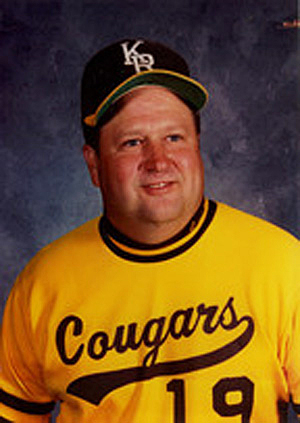
Hall of fame coach Tom Randall coached Beals at Kenton Ridge High School…and had four players ascend to the big leagues!
Randall followed Beals’ playing career at Kent State, his three years in the New York Mets’ minor-league system, his eight years as an assistant coach at Kent State, his eight years as head coach at Ball State, and his 12 years at Ohio State.
Randall often traveled with Beals and the Buckeyes. No way would he miss the first game in the new park. And he plans to make several more trips to Huntington and beyond to watch Beals and the Herd.
“He’s just been a thrill to follow as far as an athlete and as a coach,” Randall said. “I was very proud of what he accomplished at Ohio State. Coming here, it’s a brand-new start for him. And the brand-new facilities are going to definitely be a positive situation for him as far as recruiting. He is a winner.”
Beals’ desire to build a family atmosphere in his team is something he learned from Randall. But he also wanted to be sure his own family, including his three daughters, would do well with the transition to Marshall.
“Life’s good,” he said. “My family’s happy, my wife’s happy, and that was my biggest concern through this transition.”
Game day heroics
Beals’ affirmation of his family’s journey to life in Huntington reached its crescendo in a nine-inning baseball game against Manhattan. The chilliness of March 1 and the little bit of rain that fell on Jack Cook Field didn’t dampen the enthusiasm for Beals, the players or the 3,124 fans that created a compelling atmosphere complete with fireworks. And they enjoyed a 3-0 Marshall victory.

Kaup Pharmacies is a proud sponsor of amateur baseball, and youth baseball players, on Press Pros Magazine.
“It’s up there at the top,” Beals said of what they day meant to him.
Elaborate pregame ceremonies, including a flyover, created the special feeling of an inaugural game in a stadium that promises much. Then the Herd’s Drew Harlow pitched a 1-2-3 first inning punctuated by an inning-ending double play.
Then the most amazing thing happened.
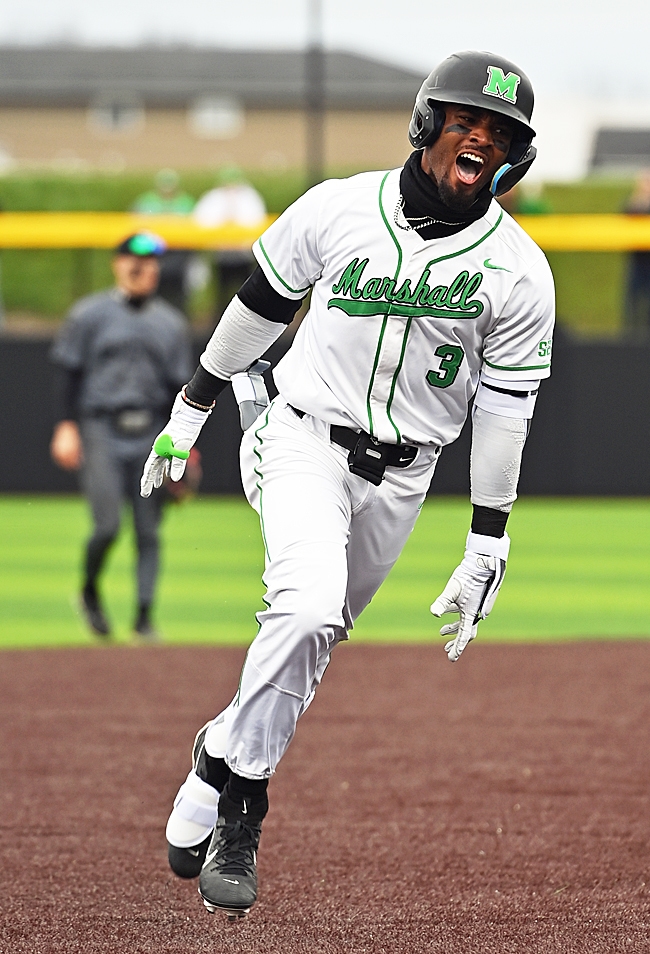
Junior college transfer Tre Hondras hit the first pitch thrown new Jack Cook Field for a Herd home run.
Tre Hondras, a junior from Chicago and a junior college transfer, hit the first pitch thrown to a Marshall player at Jack Cook Field high and deep over the left-field wall for a home run.
He circled the bases quickly, smiling all the way, then raised his arms to hype the cheering crowd after he crossed home plate.
“Honestly, I totally blacked out on the bases,” he said. “I pumped the crowd up. I didn’t mean to do that. That’s not normal in a baseball game, but today it felt like it was a moment to do something like that.”
Hondas doesn’t hit many home runs.
“It’s a blessing from the man above,” he said. “I think the grace of God pushed that ball out, blew it out a little bit, and got it over. I’m speechless to be in the history books. I don’t think there was another moment more special than that in my life.”
‘We want to bring baseball back’
Beals went to work right away two summers ago, bringing in players to help build a roster capable of competing in the Sun Belt. With a team ERA of 5.63 through a 3-8 start, the Herd needs obvious pitching help. But Beals is also building the team with the kind of people he wants.
One of those is Caden Kaiser, whom Beals recruited to Ohio State from Olentangy High School, then brought him to Marshall as a graduate student this season to be his first baseman. He is one of the Herd’s top run producers.
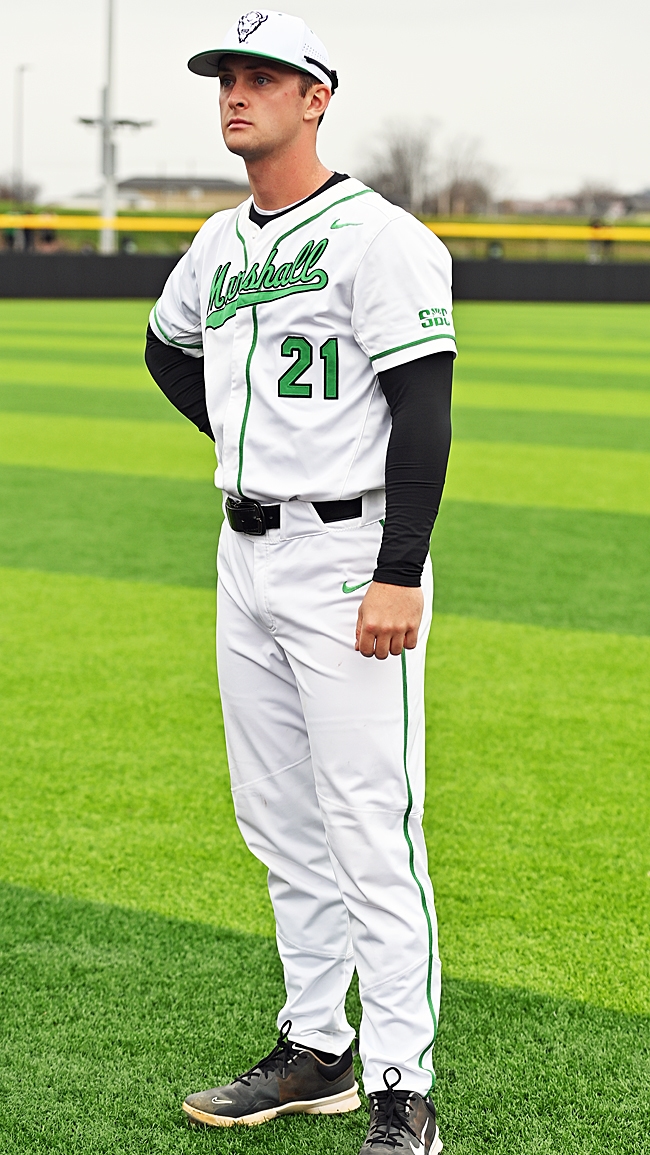
“I’ve got nothing but love for my time at Ohio State, but being able to be here now at Marshall…,” says former Ohio State Buckeye, Caden Kaiser. “I knew I was getting a great man as a leader, both on and off the field.”
“I’ve got nothing but love for my time at Ohio State, but being able to be here now at Marshall…I’m very appreciative,” Kaiser said. “I knew I was getting a great man as a leader, both on and off the field. I know how much he cares about his players, and he’s really meant a lot to me,-,helped me through some things. And I’m just thankful he had enough confidence in my ability to be able to take my fifth year and be in the lineup every day.”
Hondras, especially after what he did as the first leadoff man in Jack Cook Field history, already senses why Marshall baseball, in a stadium just a stone’s throw from the Ohio River, can be special and an actual home-field advantage.
“I love this crowd,” he said. “I came here for the community. I came here for this team. And everybody else in that dugout came here for Huntington. We want to bring baseball back here. We want to make it exciting and make it fun.”
Hondras said the family atmosphere Beals is molding is why they beat Manhattan. And while Hondras understands building a loving family and a winner takes time, he already enjoys the brotherhood.
“Our captain that’s in the front leading us to victories is making sure we’re in the right position to be successful, and without him I don’t think a lot of us would be here,” Hondras said. “So for him to recruit us to be in an environment like this, and to be in a moment like this, there’s nothing better.”
And there’s nothing better for Beals than to be their coach, their mentor, the one who teaches them to love the game more.
“I love student-athletes, I love intercollegiate athletics, and the development that these young men go through in this process,” Beals said. “I love all that.”

